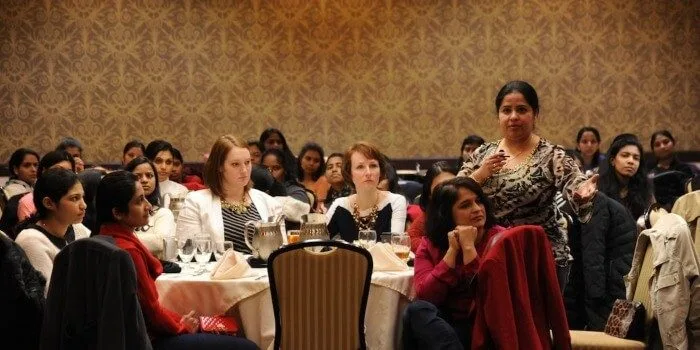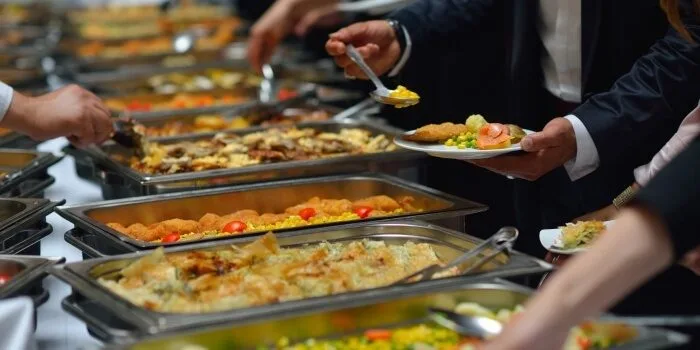When attending a conference, meals are often an essential part of the experience, but did you know they could also impact your taxes? If you’re wondering, are meals at conferences tax-deductible, the answer depends on certain conditions. Knowing the details can help you make informed decisions.
Typically, meals at conferences can be tax-deductible if they are directly related to business activities. However, specific tax laws and deductions vary by country, so it’s important to keep receipts and consult your accountant to understand your eligibility.
Curious to learn more about how to claim conference meal expenses and maximize your deductions? Keep reading to discover what qualifies and how to handle the process efficiently.
Do Conferences Provide Meals to the Attendees?
Yes, many conferences provide meals to attendees. These meals range from light refreshments to full-course dinners, accommodating the day’s schedule and session intensity. The inclusion of meals greatly depends on budgeting conference meals appropriately. It also varies based on the conference’s size and duration. Organizers often include catering as part of the event experience, enhancing networking opportunities.

Some widely recognized conference organizers often include catering as part of the event experience, enhancing networking opportunities. Smaller workshops might offer snacks and coffee, while larger conventions often provide more substantial fare. It’s a strategic move, as shared meals can foster connections and discussions among participants.
Attendees should check the conference itinerary for meal details. Knowing what’s offered helps in planning and managing dietary preferences or restrictions. Conference meals add value to the overall experience, merging sustenance with social and professional engagement.
Are Meals at Conferences Tax-deductible?
Yes, meals at conferences can indeed be tax-deductible, but this is subject to several conditions. The deductibility of these expenses hinges on their relevance to your business or professional activities. It’s essential to be aware of the specific criteria that determine whether such expenses are eligible for tax deductions.
Direct Business Connection
Meals must be directly tied to your business or professional activities to be deductible. This means they should occur in a business context, such as a networking event.
The primary purpose of the meal should be conducting business or enhancing professional knowledge. Casual dining with no clear business agenda typically does not qualify.
Reasonable and Necessary Expenses
The cost of the meal should be reasonable and necessary for your business. Extravagant or lavish meals are less likely to be accepted as deductible. The expense should align with what is typically expected in your industry. It’s about balancing cost-effectiveness with the necessity of the expense.
Documentation and Record-Keeping
Proper documentation and record-keeping are essential when claiming meals as business expenses. Be sure to keep all receipts and make notes about the meal’s purpose, including who attended and how it relates to your business activities. This ensures you have clear records for tax purposes.
In the event of an audit, having detailed documentation can protect your claim by showing the business relevance of the expense. Organized records make the process smoother and help you avoid any potential issues with tax authorities.
Percentage of Deductibility
When it comes to deducting meal expenses at conferences, it’s important to know that typically, only a portion of the cost is deductible. In many cases, tax regulations allow for around 50% of the meal expenses to be deducted, though this can vary depending on your location.
Staying informed about current tax laws is crucial. Regularly consulting with a tax professional ensures you’re applying the correct deduction percentage for conference meals.
Local vs. Travel Meals
Meals consumed locally at conferences may have different deductibility rules compared to those during business travel. Each has distinct guidelines for deductibility. Travel meals often have more leeway in terms of deductibility. However, the same principles of direct business relevance and reasonableness apply.
Consulting a Tax Professional
Because tax laws are complex and subject to change, consulting a tax professional is advised. They can provide tailored advice based on your specific circumstances. A tax expert will help navigate the nuances of deductibility. Their expertise can ensure compliance and maximize potential deductions.
Being aware of these factors ensures that you make informed decisions regarding the deductibility of meals at conferences. While there is potential for tax savings, adhering to the guidelines is crucial for lawful and effective expense management.
Types of Meals Provided at a Conference
Attending a conference isn’t just about the sessions and networking; it’s also a culinary journey. Conferences often provide a variety of meals to suit diverse tastes and dietary needs. Here’s a glimpse into the types of meals you might encounter.
Breakfast Buffets
Morning sessions are usually accompanied by breakfast buffets. The menu of the breakfast dishes for conference includes pastries and fruits to eggs and bacon. They’re designed for quick, efficient dining, ensuring attendees start their day energized. Health-conscious options like yogurt and granola are often available too.
Coffee Breaks
Mid-morning and afternoon breaks often feature coffee and small snacks. These are perfect for quick refreshments and casual conversations. Selections usually include tea, coffee, and light snacks like cookies or fruit. It’s a brief respite to recharge before the next session.
Boxed Lunches
For convenience, many conferences provide boxed lunches. These are easy to eat on the go and often include a sandwich, a piece of fruit, and a small snack. Vegetarian and gluten-free options are typically available, catering to different dietary requirements.
Sit-Down Lunches
Some conferences opt for more formal sit-down lunches. These are usually served in a banquet style with multiple courses. They provide a more relaxed atmosphere for networking and are often accompanied by a keynote speech. The menu varies but generally includes a main course, a side, and dessert.
Networking Receptions
Evening networking receptions often feature appetizers and drinks. These small bites are designed for eating while mingling, ranging from elegant canapés to mini sliders. It’s a social setting, perfect for making new connections. Alcoholic and non-alcoholic beverages are typically offered.
Gala Dinners
The highlight of many conferences is the gala dinner. This formal meal often marks the conclusion of the event. Featuring multiple courses, it’s a chance for attendees to enjoy fine dining. Live entertainment or award ceremonies often accompany these dinners.
From quick snacks to elaborate dinners, the culinary offerings at conferences cater to a variety of preferences and needs. These meals not only sustain the attendees but also enhance the overall experience, adding an enjoyable and often memorable element to the event.
Can You Bring Your Food to a Conference?
Yes, it is generally possible to bring your food to a conference, but several factors can influence this decision. The norms and rules regarding outside food can vary depending on the venue and the nature of the conference. Understanding these factors can help you decide whether to pack your snacks or meals.
Conference Policies
Each conference has its own set of rules about outside food. It’s important to check the event’s policy beforehand. Some venues may have strict regulations against outside food due to catering contracts. Always consult the event organizers or the conference website for specific guidelines.
Type of Venue
The venue hosting the conference plays a key role in this decision. Convention centers or hotels might have stricter rules compared to university campuses. High-end venues often have exclusive catering rights, limiting outside food. More relaxed venues like public halls may be more accommodating.
Health and Dietary Needs
Personal dietary restrictions or health needs can necessitate bringing your food. If you have specific dietary requirements, it’s practical to bring your meals. Communicating with conference organizers about dietary needs can sometimes result in tailored catering options. However, having your food ensures you adhere to your dietary needs.
Length of Conference
The duration of the conference also impacts this decision. For longer events, it might be more convenient to rely on provided meals. Shorter conferences or seminars might not offer extensive catering, making it sensible to bring snacks. Consider the length and schedule of the event when planning your meals.
Networking and Socializing
Meal times at conferences are often key networking opportunities. Eating separately can sometimes mean missing out on these interactions. Joining others for meals can lead to valuable professional connections. Weigh the social benefits against the convenience of bringing your food.
Bringing your food to a conference is usually possible, but it’s important to consider the event’s policies, venue restrictions, personal dietary needs, length of the conference, and the potential for networking. Making an informed decision ensures that your meal choices enhance your conference experience rather than detract from it.
Strategies for Maximizing Tax Deductions on Conference Meals
Attending conferences can offer more than just learning and networking opportunities. It can also provide financial benefits through tax deductions on meals. However, tax deductibility of conference meals requires strategic planning and an understanding of tax laws. Here are key strategies to effectively manage and maximize tax deductions including for meals.
- Know Eligibility Criteria: Ensure the meal is directly related to your business or profession to qualify for the deduction. Familiarize yourself with tax laws to determine what constitutes a business-related meal.
- Keep Detailed Records: Save all receipts and document the business purpose of each meal. Detailed records make it easier to justify the expenses during tax filing.
- Stay Reasonable: Choose moderately priced meals to avoid the label of extravagance, as lavish meals might not be fully deductible. The expense should align with typical costs in your industry.
- Know the Limits: Be aware that only a portion of meal expenses might be deductible. Check current tax laws for the specific percentage allowed for conference-related tax deductions, including meals.
- Separate Personal and Business Expenses: If the conference combines business and leisure, only deduct meals directly related to business activities. Personal meal expenses during the conference are not deductible.
- Use Company Credit Cards: Pay with a business account or company credit card to streamline record-keeping. This practice helps in clearly distinguishing business expenses from personal ones.
- Consult a Tax Professional: Seek advice from a tax expert to ensure compliance with regulations. A professional can offer tailored guidance for your specific situation.
Maximizing tax deductions on conference meals involves a careful balance of understanding eligibility, maintaining records, and staying informed about tax laws. By implementing these strategies, you can effectively manage your expenses while ensuring compliance with tax regulations. Remember, when in doubt, consult a tax professional for the best course of action.
FAQs
People searching about conference meal expenses also search for these related questions. Our experts have answered the questions with adequate answers to provide readers with additional information about conference meal expenses.
How do I claim conference meal deductions on my taxes?
To claim deductions, include the meal expenses in the business expense section of your tax forms. Make sure you’ve kept accurate records, including receipts and details of the conference, and check with your accountant for specific instructions.
What Documentation is Needed to Deduct Conference Meal Expenses?
You should keep detailed records, including receipts, the names of attendees, the purpose of the meeting, and the nature of the business discussed. Proper documentation ensures that the expenses meet IRS requirements and can be substantiated if audited.
Are Meals Provided at Networking Events During a Conference Deductible?
Meals at networking events during a conference can be deductible if they have a clear business purpose related to the conference. However, the deduction is usually limited to 50% of the meal cost, and proper documentation must be maintained.
Can Meals Be Deducted if the Conference is Virtual?
No, meals consumed during a virtual conference from home or office are generally not deductible because they do not meet the IRS requirement of being away from the tax home for business purposes. Only travel-related meal expenses qualify under typical deductibility rules.
Can Businesses Deduct Meal Expenses for Employees Attending Conferences?
Businesses can deduct meal expenses incurred by employees at conferences as long as the expenses are ordinary, necessary, and directly related to business activities. The deduction is typically limited to 50% of the meal cost unless specific conditions apply.
Conclusion
In summing up the discourse on conference meals, it’s evident that these events offer more than just knowledge and networking; they also present financial considerations. The culinary aspect of conferences, ranging from breakfast buffets to gala dinners, adds a unique dimension to these professional gatherings.
Central to this discussion is the query ‘Are meals at conferences tax-deductible?’ The answer lies in understanding the complex tax regulations. Meals are deductible when they align with business purposes and are reasonable in cost, highlighting the importance of strategic planning and adherence to tax guidelines.
The blend of delightful culinary experiences and the potential for tax savings makes conferences a multifaceted affair. Attendees can maximize these benefits by staying informed and consulting tax professionals, ensuring a rewarding and compliant experience at these events.







